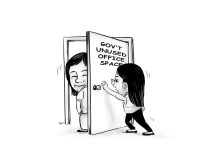
THE allure of the global market is undeniable. It offers choices, versatility, and often, convenience. However, an over-reliance on importation can prove costly, not just in financial terms but also in terms of national pride and self-sufficiency.
The shock at the P10-billion budget allocated for importing chemical fertilizers is more than just a reaction to a large figure; it’s a call for introspection. At its core, the outcry raises an important question: Should a country like the Philippines, rich in natural resources and manpower, rely so heavily on imports?
Indeed, importation should be viewed as a temporary solution, a band-aid for a bleeding wound. But the real remedy is to cultivate our own resources and invest in our own people. Economists and environmentalists alike have long argued the merits of local production. It reduces transportation emissions, supports local economies, and fosters a sense of community.
Yet, beyond the economics of it, there is a deeper, more emotional facet to this discussion. The Philippines, once a beacon of progress in Southeast Asia, now lags behind neighbors like Vietnam, Thailand, and Indonesia in agriculture. The reason? Perhaps it is the over-dependence on foreign goods, which has stymied local innovation and enterprise in agriculture.
The advocacy for composting machines serves as a tangible example of how local solutions can address national issues. By transforming kitchen and garden waste into organic fertilizer, not only do we address waste management and reduce our carbon footprint, but we also support local farmers and encourage urban gardening. This is sustainable development in its truest form.
As we ponder on the nation’s direction, perhaps it’s time to re-evaluate our penchant for the foreign. The path forward requires a balance. Global collaboration is crucial, but so is nurturing our own soil. The P10 billion in question could be just the catalyst needed to spark a broader conversation about the Philippines’ future, a future that embraces the global but cherishes the local.







